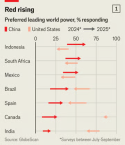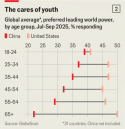I don't understand why high-priced rice has lasted almost two years in Japan. In China, if such a situation occurs, it will be resolved within one month!
Last edited:
As far as I can recall, China has never experienced a rice shortage since the launch of its reform and opening-up policy.I don't understand why high-priced rice has lasted this long in Japan. In China, this situation wouldn't persist for more than a month.
Yes. China will take measures to prevent such situations from occurring, and even if they do happen, they will be resolved promptly.As far as I can recall, China has never experienced a rice shortage since the launch of its reform and opening-up policy.
Before I explain why consider this news:I don't understand why high-priced rice has lasted almost two years in Japan. In China, if such a situation occurs, it will be resolved within one month!


A lot of Japanese people do rice farming as a hobby rather than a business. Kind of like allotments in the UK.Before I explain why consider this news:
Current government solution is... to decrease rice production next year to prop up price.
Now as to why it's so messed up, this is entirely a man made problem. Japanese rice farms tend to be small with tiny plots and family run. Their small size prevents deployment of investment that would increase farming efficiency like large combine harvesters or large agricultural drones. Look at some of their combines:

So why don't some farmers sell their farm so that the farm land gets aggregated into a smaller number of larger farms that better suit industrialized farming? Because they have an organisation called that is a powerful lobby that explicitly aims to prevent this. Why? Because farmers are voting base for LDP and they don't want this voter base to decrease in size.
So this inefficiency is entirely politically motivated. You know how high tariff is often a sign of protection for inefficient domestic production? You look at rice import tariff for Japan and that gives you a clue as to just how much inefficiency is in the system:
View attachment 164430
Web Summit attendees appeared to be incredibly curious, at the very least. Tuesday’s China programming was delivered to an audience in the high hundreds, with standing room only for much of the first hour—even during a comparatively dry discussion of China’s 15th five-year plan. A few feet away, a smaller but equally enthusiastic crowd gathered to gawk at and take videos of two humanoid robots from Chinese start-up Unitree, one of which entertained them with a clumsy but somewhat endearing break dance.
The Chinese government’s involvement in Web Summit (though the country’s tech giants—such as Huawei, Tencent, and Alibaba—have participated separately in past editions) came about through conference founder Paddy Cosgrave’s through the country around six weeks ago. Cosgrave effusively praised China’s technological prowess in a series of LinkedIn posts—including one that that “China has won the 21st Century. There is no great power competition. It’s over.” He also his intention of hosting a Web Summit in China in 2027, adding to the conference’s global editions in Rio de Janeiro, Vancouver, and Doha.
“I think it’s very difficult to deny or ignore the achievements of China, not just over the last decade but even in the last year,” he said on Tuesday while opening the China Summit. “I think it’s very important that Web Summit provides opportunities for all of our attendees not just to meet with those building the cutting-edge companies that are emerging from China but also opportunities to hear from speakers with diverse views on why China is achieving what it is achieving.”
To test this thesis, The Economist, working with GlobeScan, a consulting and polling firm, asked 32,000 people in 32 countries for their views on China and America between July and September. The results are startling. Since we last asked the question a year ago, China has made big gains as the world’s preferred “leading power” (see chart 1). The share of respondents favouring China jumped by 11 percentage points to an average of 33%. Meanwhile, support for America slipped below a global majority to 46%.
Preference for China strongly correlates with age: the younger the respondent, the more likely they are to welcome Chinese leadership (see chart 2). Among 18- to 24-year-olds America and China are nearly tied for support at 41% and 39% respectively. Among those over 65 years old, America has a commanding 30-point lead. Many youngsters use Chinese products and services, like the video-sharing sensation TikTok, or follow social-media influencers who have visited China. (Earlier this year, state media were found offering expenses-paid trips to China to such types.)


Global opinion has shifted in 2025, especially with younger generations.
Well, this is the year the US has been winning every day according to Trump.This is shocking considering it's only a single year.
No he got debunked multiple times he first said the dog claw got stuck, the said he reach for zin, then covered the shock ports with tape then said it was a vibrate only,
That got debunked. He's a dog abuser no if or buts an any who defends him is sick this is old dog BTW the collar is so tight it's digging in the dogs skin and they is a vid of him pulling the dog by its tail an saying he will kill it hes terrible even educator company said it's a shock collar that he's used to shock Kaya he has the dog in the corner of the stream like a prop for hours
The prongs are very easy to take out
View attachment 164313View attachment 164314
